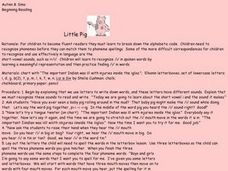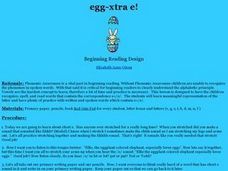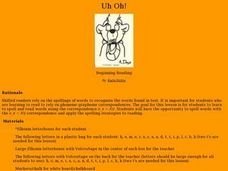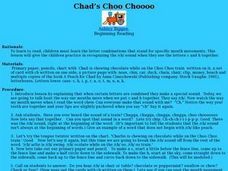Curated OER
O-o-o-oh, no-o-o-o!!
Students engage in an emergent literacy lesson in order to practice the skill of phonemic awareness. They learn this skill using the phoneme for the letter "o". Students must recognize the letter as well as its sound.
Curated OER
Sound Stretching
In this basic vowel and consonant blending lesson, young learners are shown how to "blend" the sounds of different letters together in order to make a word. Simple words such as, "sun," "moon," and, "ant," are used in a whole-class setting.
Curated OER
Choo Choo Train
First graders study the sound and spelling of the /ch/ digraph. They repeat words containing the "ch" before making words using their Elkonin letterboxes and letter manipulatives. Next, they clap each time they hear the "ch" digraph...
Curated OER
The Crying Baby
Students practice recognizing phonemes with letters emphasizing the /a/ in spoken words and by letter symbols. They interact with Elkonin boxes, letter manipulatives, the book, "A Cat Nap," and a poster with a tongue twister on it.
Curated OER
U-u-under The U-u-umbrella!
Students practice using phonemes because they need to be able to recognize that phonemes and letters correspond with each other in order to become a proficient reader. The practice is done using the letter "u".
Curated OER
Nick's Sticky, Icky Fingers
Learners examine the letter 'i'. Through instruction and modeling they explore the sound the letter makes, how the letter is written, words that contain the letter, etc. They use letterboxes to write 'i' words and read stories containing...
Curated OER
Chocolate Chicken
Students identify digraphs in written and spoken language. After a brief discussion on the combinations of letters that comprise digraphs, students practice identifying initial and final placement of the digraph /ch/ in words and tongue...
Curated OER
What's Up Doc?
Students demonstrate the /o/ sound by opening up their mouth and saying, "Ahhhhh". They try saying a tongue twister that contains the /o/ phoneme; repeating it two times together. They then practice writing the letter /o/ so that it can...
Curated OER
Little Pig
First graders discover that letters are used to write words and that they have different sounds. They pronounce the word, "pig" emphasizing the /i/ sound. They say a tongue twisters that features the /i/ sound in each word. They then...
Curated OER
Shiny Shells on the Shore
Students investigate how: A single phoneme, which is a vocal gesture in spoken words, can be represented by more than one grapheme. Also how a digraph is the combination of two letters that make one sound (there are both vowel and...
Curated OER
Egg-xtra E!
First graders recognize the short vowel e in written and spoken language. Through listening activities, they discriminate the vowel sound /e/ from other phonemes. Students identify the phoneme and letter in words and sentences they write.
Curated OER
The Squeaky Creaky Elevator
Learners engage in an emergent literacy lesson in order to help develop the skills of letter recognition and corresponding sound of the phoneme. This is done with the use of a tongue twister using the phoneme of the letter "e".
Curated OER
Vowel Sounds - Short Aa Words
In this short "Aa" worksheet, 1st graders use the number code and find the letters for each number to spell out the small words. Students spell 20 words.
Curated OER
Short Vowels
In this short vowels worksheet, 1st graders listen for the short vowel sounds by saying the picture word slowly and listening for the sounds. Students circle one letter from each column for the beginning, middle, and final sound....
Curated OER
Uh Oh!
Help your elementary learners distinguish between short and long vowel /o/ sounds. They are introduced to the vowel-consonant-e pattern that changes short vowel sounds into long vowel sounds. Then they practice reading and spelling words...
Curated OER
Icky Fingers
Which i sound is used in the word icky? Kindergarteners and first graders listen to the short /i/ sound. They practice shaking their fingers to indicate icky when they hear the target sound. Then they practice reading a poster with the...
Curated OER
Chad's Choo Choooo
Choo, choo! Do your youngsters like trains? After studying the target sound, have your learners read A Peach for Chad. Do a class read and an independent read to increase fluency. At the lesson's close, consider creating a ch train...
Curated OER
OW! I stubbed by toe
Drill and practice the /ow/ sound! Kids practice recognizing pictures that begin with the ou=/ou/ correspondence. They experience a letterbox lesson to help implement this task before them as well as reading the story, The Napping House,...
Curated OER
How Many Feet Will We Meet?
Emerging speakers distinguish between the sounds for short vowel /e/ and long vowel /e/. They are introduced to the vowel patterns that comprise the long vowel sounds, with emphasis on /ee/. They practice reading and spelling a variety...
Curated OER
Stressed Syllables in Spanish Words
Pronunciation guides really help beginning Spanish speakers. You don't have to know the word to know its pronunciation. Consider including a few words at the bottom and having your class underline where the stress belongs.
Curated OER
Blast-Off to Blending
Practice working with different phonemes in consonants and vowels. Sounds are written on squares that get put on a rocket to "blast off" and meet other sounds. The teacher first models blending, then reads the new words. Young readers...
Curated OER
Short Vowel Sounds
Use this resource to provide a quick review of words with short vowel sounds. Learners view pictures, and read and write words with the short vowel sound o. Afterwards, they write a sentence using some of the short o words. Students...
Houghton Mifflin Harcourt
Silly Stories: Extra Support Lessons (Theme 1)
Kids who need extra support with the concepts in the Houghton Mifflin Harcourt thematic unit on silly stories, will benefit from this packet packed with skill builders, activities, exercises, and practice sets.
Curated OER
Funny Fish
For this funny fish: consonants and vowels learning exercise, learners color and cut out ten fish, then paste them into the vowel tank or the consonant tank.























